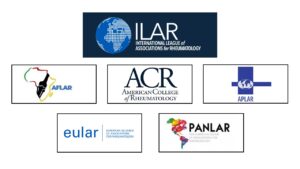Rheumatic disease affects people from every spot on our globe. This links the practice of rheumatology together as one worldwide community working collectively to improve the lives of our patients. Being part of a large, international rheumatology network has long been appreciated by the ACR, where the spirit of connection with individuals and organizations to advance rheumatology has been an integral part of our culture.
The ACR Vision Statement speaks to our goal of continually advancing the specialty and the future of rheumatology. This guiding principle has no geographic boundaries and recognizes that, when working side by side, we can enhance care that benefits patients with rheumatic disease. Through committees, partnerships, projects and meetings, the ACR seeks to be an active and engaged member of the global rheumatology community.
Global Engagement Committee
In 2020, the ACR established the Global Engagement Committee (GEC) to foster and coordinate international ACR/ARP activities, collaborations and exchanges. The GEC focuses on promoting productive interactions between the ACR and its international members and constituents, and it coordinates with other ACR/ARP committees on projects that have a global reach.
International Collaborations
The ACR has active partnerships with its fellow international organizations, which include:
- AFLAR—African League of Associations for Rheumatology;
- APLAR—Asia Pacific League of Associations for Rheumatology;
- EULAR—European Alliance of Associations for Rheumatology;
- PANLAR—Pan American League of Associations for Rheumatology; and
- ILAR—International League of Associations for Rheumatology.
ILAR
ILAR was established in 1927, and with the assistance of the ACR, it was reincorporated in 2007. Since that time, the ACR has served as the organization’s administrative office, including oversight of its finances, operations and programs. The ILAR Executive Committee consists of the presidents and presidents elect of its partner organizations, AFLAR, ACR, APLAR, EULAR and PANLAR. ILAR is committed to advancing rheumatology in developing countries and issues annual grants that lead to progress in the practice and education of rheumatology in countries where there is an exceptional need. This mission is supported by the ILAR journal, Clinical Rheumatology.
Research Exchange Program
The purpose of the Research Exchange Program is to promote the international exchange of research skills, expertise and knowledge within rheumatology. The program provides exposure to the work being done by colleagues around the world and creates opportunities for collaboration. The ACR selects candidates through an application process for exchange programs held in conjunction with EULAR and APLAR. The target audience is junior academic rheumatologists and rheumatology professionals pursuing rheumatology research. In conjunction with ACR Convergence 2025, the ACR will host research exchange scholars from EULAR, APLAR and PANLAR.

